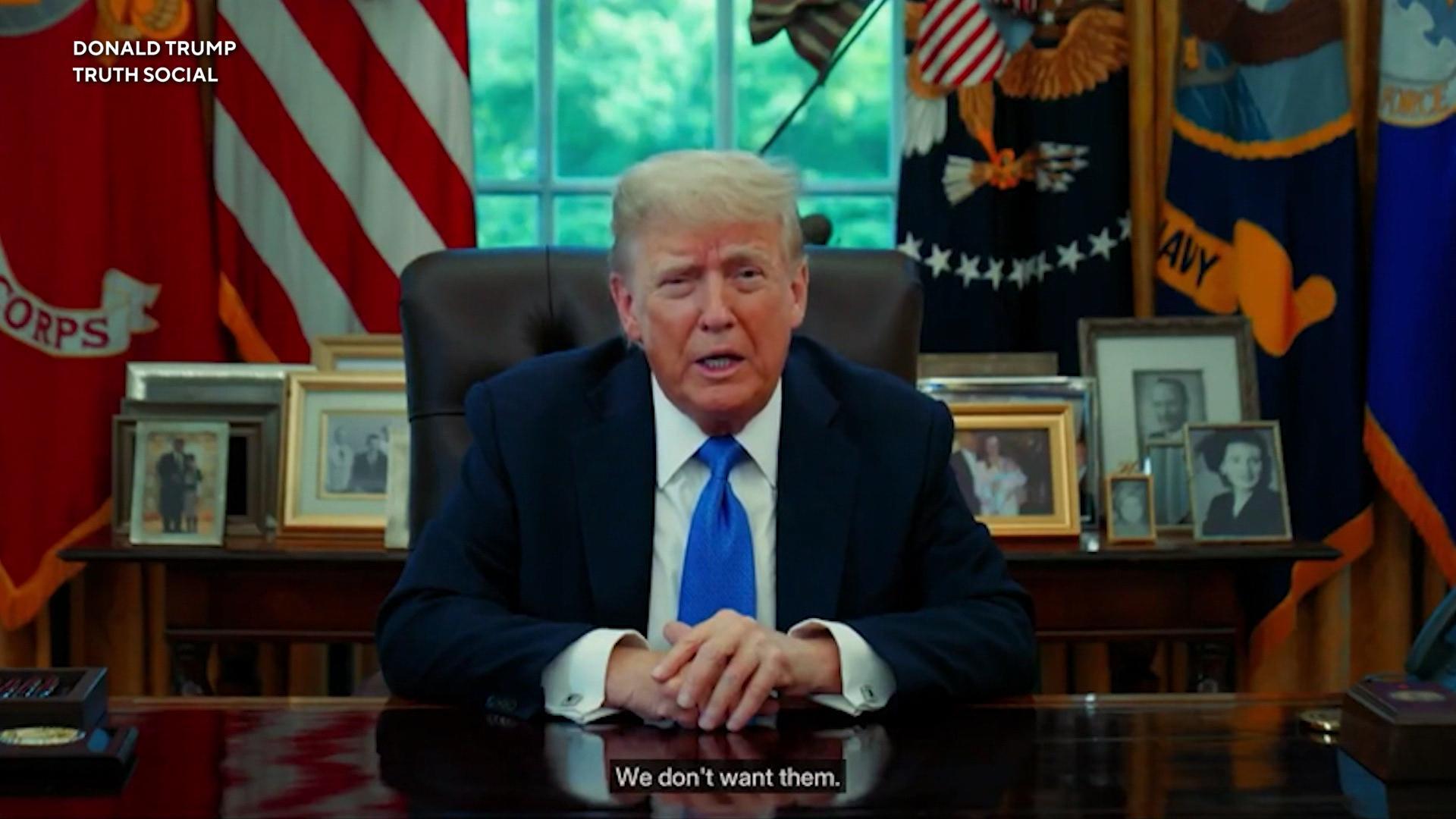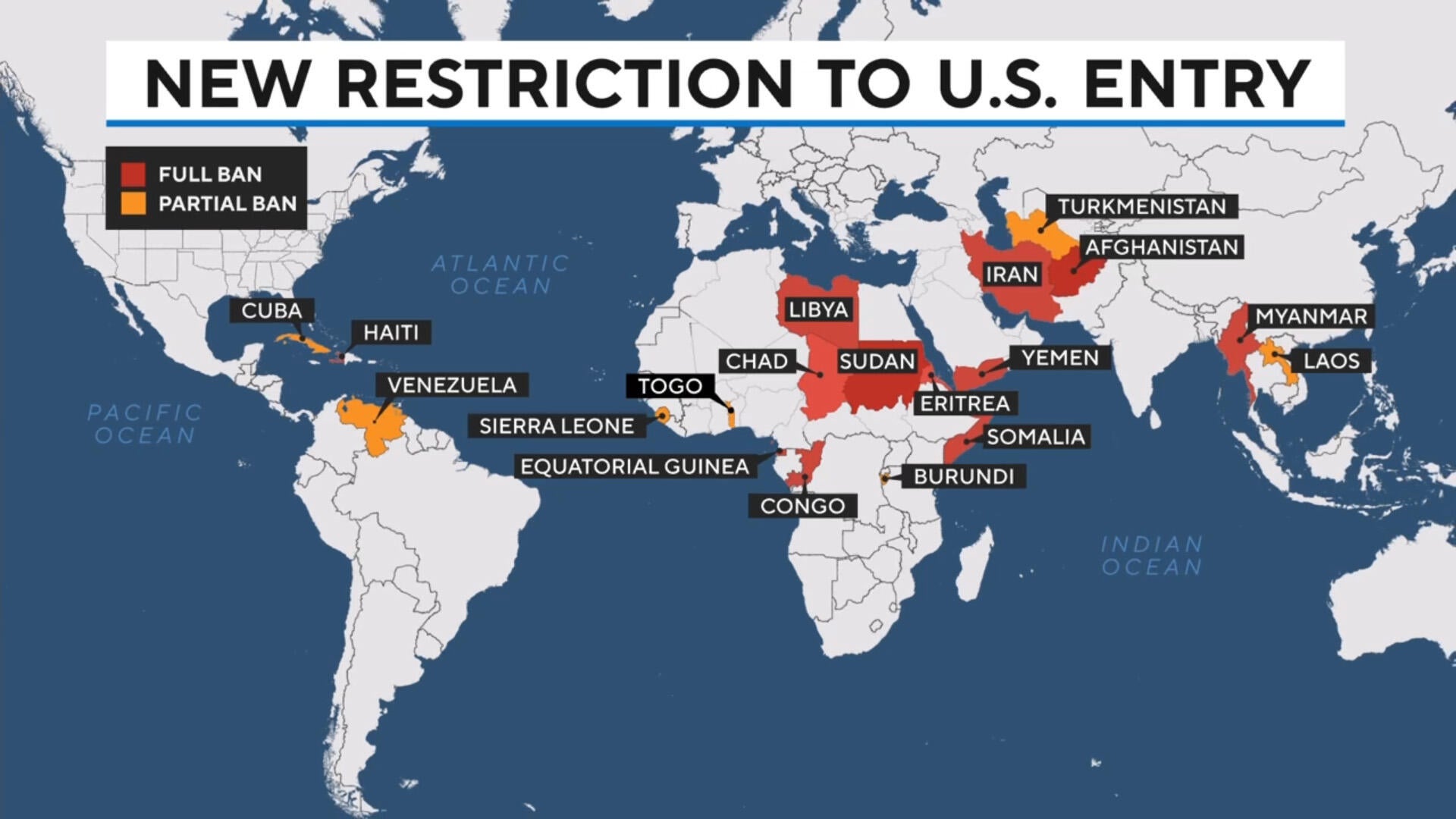Trump's travel ban is set to begin Monday. Here's what to know.
Washington — President Trump signed a proclamation late Wednesday barring travelers and immigrants from 12 countries and restricting the entry of nationals from seven other nations.
With the move, the White House cited concerns about national security. The president said the recent attack at a march supporting Israeli hostages in Boulder, Colorado, had "underscored the extreme dangers posed to our country by the entry of foreign nationals who are not properly vetted, as well as those who come here as temporary visitors and overstay their visas."
"We don't want them," Mr. Trump said.
Here's what to know about the travel bans:
What are the travel ban countries?
With some exceptions, the proclamation bans the entry of foreigners from 12 countries who are seeking to come to the U.S. permanently as legal immigrants, as well as those with temporary visas, including tourists:
- Afghanistan
- Myanmar
- Chad
- The Republic of the Congo
- Equatorial Guinea
- Eritrea
- Haiti
- Iran
- Libya
- Somalia
- Sudan
- Yemen
The proclamation also partially suspends the entry of travelers and immigrants from another seven countries. This restriction applies to legal immigrants seeking to move to the U.S. and certain temporary visa holders who hail from the following countries:
- Burundi
- Cuba
- Laos
- Sierra Leone
- Togo
- Turkmenistan
- Venezuela
When does the ban take effect?
The ban is set to take effect at 12:01 a.m. on Monday, June 9.
Why were the countries selected?
On the first day of his second administration, Mr. Trump directed officials to perform a security review of high-risk regions and make recommendations for where immigration and travel restrictions should be imposed.
The president said the factors considered were "the largescale presence of terrorists, failure to cooperate on visa security, inability to verify travelers' identities, inadequate record keeping of criminal histories and persistently high rates of illegal visa overstays, and other things."
"Very simply, we cannot have open migration from any country where we cannot safely and reliably vet and screen those who seek to enter the United States," Mr. Trump said.
The president cited the recent attack in Boulder, where an Egyptian national was charged, as part of the justification for the bans. Egypt is not among the countries on the White House's list. But the proclamation directed officials to assess the "adequacy" of Egypt's vetting policies "in light of recent events."
Are there exceptions to the new travel ban?
The president's decree contains certain exemptions, including for U.S. permanent residents and the spouses and children of U.S. citizens who have "clear and convincing evidence of identity and family relationship."
The proclamation also outlines exemptions for Afghans who assisted American forces and have special visas; diplomats; athletes coming to the U.S. for the World Cup, the Olympics and other major sporting events; dual nationals with a passport from a country not listed in the president's decree; and for adoptions.
Mr. Trump said the list could be revised if countries make "material improvements," and new countries could be added "as threats emerge around the world."
Did Trump do this before?
The president's actions follow a series of travel bans issued during his first administration that initially targeted predominantly Muslim countries. Like those orders, his latest proclamation could be subject to lawsuits, although the Supreme Court ultimately upheld the revised ban from his first term, which the White House noted in a fact sheet outlining his second-term bans.
The president touted his first-term travel bans in his video statement released Wednesday.
"In my first term, my powerful travel restrictions were one of our most successful policies, and they were a key part of preventing major foreign terror attacks on American soil," Mr. Trump said.
In January 2017, Mr. Trump signed a travel ban restricting the entry of most citizens of Iran, Iraq, Libya, Somalia, Sudan, Syria and Yemen. The ban sparked widespread outcry, creating chaos at airports and prompting legal challenges, as opponents argued the ban was discriminatory.
Then in March 2017, Mr. Trump removed Iraq from the list and added Chad, Venezuela and North Korea. The president expanded the ban in 2020, adding immigration restrictions for nationals of Nigeria, Eritrea, Sudan, Tanzania, Myanmar and Kyrgyzstan. Chad was later removed from the list.
The third iteration of the president's first-term ban was upheld by the Supreme Court in the summer of 2018. At the time, conservative justices cited the president's broad authority to restrict the entry of foreigners on national security grounds. When President Joe Biden took office, he scrapped that ban.






